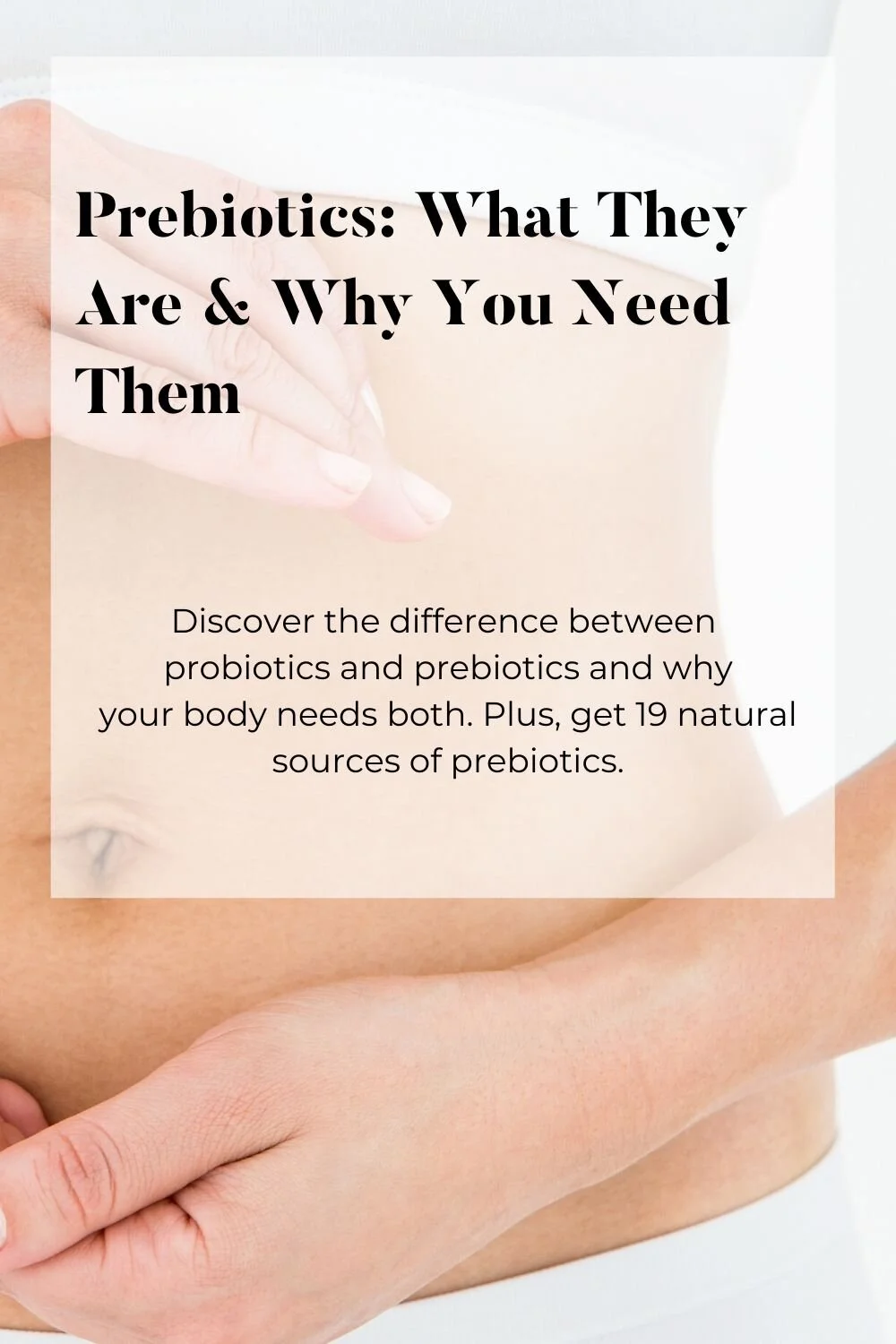Prebiotics: What They Are and Why You Need Them
“Prebiotics? Don’t you mean probiotics?” That’s the response I often get when I mention prebiotics. Prebiotics are different than probiotics and serve a very important purpose. I’m going to explain what prebiotics do and the important role they play in your wellbeing.
Prebiotics vs probiotics
First, let’s explain the difference between prebiotics and probiotics.
What are probiotics?
Probiotics are live microorganisms that may help prevent and treat some illnesses. They’ve been shown to promote a healthy digestive tract and lead to a healthy immune system.
Probiotics are commonly referred to as good or healthy bacteria. They’re present in fermented foods like sauerkraut, yogurt, kimchi, and kombucha.
What are prebiotics?
Prebiotics are undigestible dietary fibers that feed your gut’s good bacteria. An interesting fact is that they’re only available in plants. You can think of prebiotics as a fertilizer that feeds the good bacteria in your gut.
What’s the difference between prebiotics and probiotics
A simple way to remember the difference is that prObiotics are the good Organisms inside your gut and the prEbiotics act as the food that provides Energy for the living organisms.
So much of your health is affected by your gut. And prebiotics play an important role in maintaining your gut health.
The importance of a healthy gut
Here’s a fact that will blow your mind: the total surface area of your gut is larger than a tennis court, but the lining is only one cell thick. That thin lining is all that protects our “inner core from the outer chaos” Dr. Greger explains.
That thin cell lining is fueled and kept alive by a short-chain fatty called butyrate. Our good bacteria make butyrate from the fiber we eat. Dr. Greger goes on to explain this process. “We feed the good bacteria in our gut, and they feed us right back. They take the prebiotics we eat, like fiber, and in return provide the vital fuel source that feeds the cells that line our colon, a prototypical example of the symbiosis between us and our gut flora.”
Isn’t bacteria bad?
When we initially think of bacteria, we think of the bad stuff – the reason we wash our hands and sanitize things. But we have trillions of bacteria in our gut, both good and bad.
So, how does your body know which bacteria are good and which are bad?
Your immune system is constantly working to maintain a balance between the two. When this balance is disrupted our body begins attacking the good bacteria leading to inflammation like bowel disease.
But how does your body know the difference? What maintains this balance?
Butyrate suppresses the inflammatory reaction and explains to your immune system not to attack the good bacteria. Research suggests that butyrate informs our immune system that the relative levels of good bacteria are within the desired range.
When you don’t eat enough fiber your body is unable to make enough butyrate. As Dr. Greger explains, we could have a lot of good bacteria in our gut, but without butyrate your body thinks the gut must be filled with bad bacteria and reacts accordingly.
Our body can mistake low fiber intake for having a population of bad bacteria in our gut. Our body doesn’t know about processed food. Historically, we’ve lived on high fiber intake as our body was intended.
But on a low-fiber diet, one in which our body detects low butyrate levels in the gut, it doesn’t think low fiber—as far as our body’s concerned, there’s no such thing as low fiber—it thinks bad bacteria which leads our body to respond with an inflammatory offensive.
Health benefits of prebiotics
A diet rich in prebiotics provides you with many health benefits such as: improved regularity, improved immune function, vitamin production, more sustained energy, less leaky gut, more calcium absorption, improved bone density, less inflammation, decreased appetite, fat loss, improved brain function, and more.
How many prebiotics should you eat each day
The short answer is it depends on who you ask. But the general consensus is that we should be consuming between 25-40 grams per day. In general, women should be getting 25 grams of fiber per day, and men should be getting 38 grams per day.
The term prebiotic is new, but research on human coprolites (i.e. fossilized human poop), shows that we’ve been consuming prebiotics throughout human history. Historically, humans have consumed as much as 135 grams of prebiotic fiber each day.
Today, the average Western diet contains less than 3.5 grams of prebiotic-specific fiber each day. From 135 grams per day to less than 3.5? It’s no wonder so many people suffer from poor gut health.
Prebiotics food list
Now that you know the benefits of prebiotics, you’re probably wondering, “How do I add prebiotics to my diet?”
Avoid fiber supplements, and instead, consume whole plant foods. Fiber supplement like Metamucil can’t replicate the results of natural plant-based fiber.
Here is a list of 19 prebiotic foods:
1. Chicory Root
2. Dandelion Greens
3. Jerusalem Artichoke
4. Garlic
5. Onions
6. Leeks
7. Asparagus
8. Bananas
9. Barley
10. Oats
11. Apples
12. Konjac Root
13. Cocoa
14. Burdock Root
15. Flaxseed
16. Yacon Root
17. Jicama Root
18. Wheat Bran
19. Seaweed
Prebiotic conclusion
Yes, we need both prebiotics and probiotics! Without a healthy supply of prebiotics the good bacteria in your gut will starve. As a result, your body’s immune system will suffer making you susceptible to many health problems. So, remember to feed your gut’s good bacteria with prebiotic foods to maintain your gut health.



